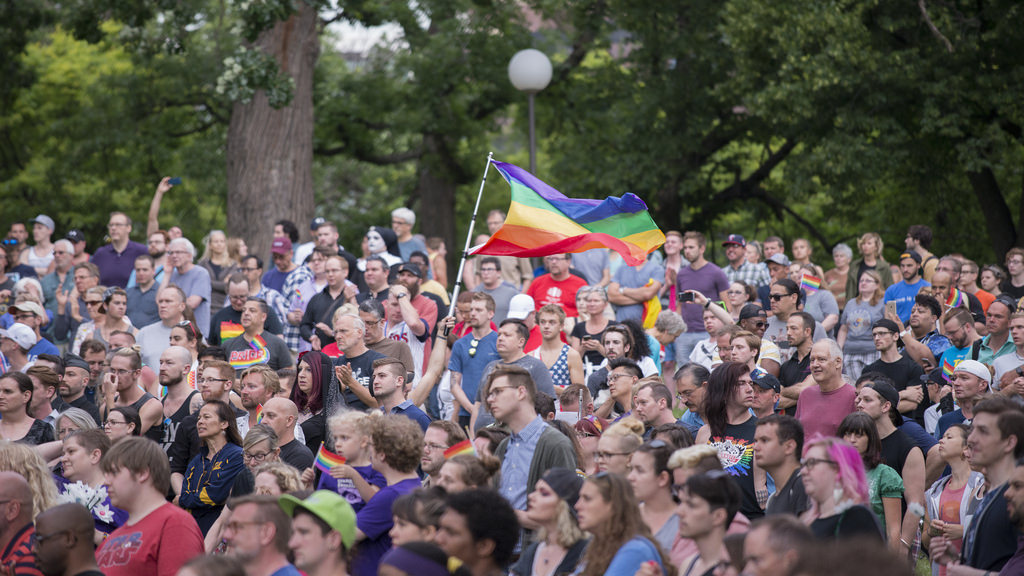Abortion rights, women of color, and LGBTQIA+ people are under attack. Pledge to join us in fighting for gender justice.
Six Ways Legislators Can Be Proactive About LGBTQ Rights

 This Pride month, I’ve been reflecting on what’s happened this year for LGBTQ rights in North Carolina – my home state. Earlier this year, after the North Carolina legislature sought to “repeal” HB2—famously known as “The Bathroom Bill”—the NCAA and the ACC subsequently decided to bring their business back to North Carolina. But the Legislature pulled a fast one here as the so-called repeal fell short in many ways. HB2 was best known for barring transgender people from using multi-stall bathrooms that aligned with their gender identity. But for those of you who aren’t super familiar with this discriminatory piece of legislation, it wasn’t just about bathrooms. And neither was its replacement bill—HB142.
This Pride month, I’ve been reflecting on what’s happened this year for LGBTQ rights in North Carolina – my home state. Earlier this year, after the North Carolina legislature sought to “repeal” HB2—famously known as “The Bathroom Bill”—the NCAA and the ACC subsequently decided to bring their business back to North Carolina. But the Legislature pulled a fast one here as the so-called repeal fell short in many ways. HB2 was best known for barring transgender people from using multi-stall bathrooms that aligned with their gender identity. But for those of you who aren’t super familiar with this discriminatory piece of legislation, it wasn’t just about bathrooms. And neither was its replacement bill—HB142.
For example, HB2 prohibited local governments from passing antidiscrimination laws that protect LGBTQ+ people. And under HB 142 local governments are still prevented from passing nondiscrimination laws until at least December 1, 2020. Moreover, HB142 does not provide any protections against LGBTQ+ discrimination. This means that businesses can still fire and refuse services to people who identify as LGBTQ–and that’s just one negative implication of the law. Unfortunately, this fake HB2 repeal passed.
Even though Governor Cooper campaigned on repealing HB2, he still agreed to a deal that significantly harms the LGBTQ+ community. And you know what? It is so important let policymakers know we expect more.
So, this Pride Month, it’s time that we raise the bar. Why don’t we hold our politicians to a higher standard—one that expects more than reactionary policies?
Here are six proactive policies that legislators in North Carolina (and other states!) can implement right now to benefit the LGBTQ+ community:
1. Develop and invest in community resource centers and programs to foster LGBTQ+ community and provide a space free of discrimination and violence, especially for homeless LGBTQ+ people, LGBTQ+ people of color, and LGBTQ+ youth.
People who identify as LGBTQ+ are more likely to experience violence, homelessness, and suicidality. It is important to create supportive community spaces for those who are the most marginalized to both help work through the trauma and loneliness associated with discrimination and violence and help build a positive LGBTQ+ experience.
2. Develop and invest in public education campaigns to fight discrimination and violence against LGBTQ+ communities.
Violence prevention experts have noted that some of the best ways to prevent violence are public advertising campaigns that celebrate marginalized groups and break down stereotypes associated with them.
3. Implement specific nondiscrimination policies within schools and workplaces to ensure that LGBTQ+ people are safe and valued in every aspect of their daily lives.
PEOPLE WHO IDENTIFY AS LGBTQ+ ARE STILL BEING FIRED OR REFUSED SERVICE BECAUSE OF THEIR SEXUAL ORIENTATION OR GENDER IDENTITY. IT IS 2017, Y’ALL.
4. Invest in, develop, and normalize LGBTQ+ positive sex and healthy relationship education—and reject sex education that excludes and negatively portrays queer relationships.
LGBTQ+ youth have the right to understand their bodies and how to protect themselves from sexually transmitted diseases. Additionally, members of the LGBTQ+ community experience higher levels of sexual assault and interpersonal violence. This is partly because discrimination often justifies violence in the eyes of the dominant group, and partly due to minority stress—the pressure that comes with being marginalized from society. It is important to ensure that LGBTQ+ relationships are 1) normalized in sex and relationship education, along with their heterosexual and cisgender peers and 2) celebrated so that queer youth can have access to healthy relationships and sex lives, free from trauma.
5. Allocate specific funds for LGBTQ+ positive literature in schools.
The lack of queer positive literature is truly astounding—let alone queer positive literature that features queer people of color, low-income queer people, queer people with disabilities, or any combination of the above. It is important to ensure that from a young age, LGBTQ+ youth and their peers have a positive view of a diverse array of relationships and genders.
6. Invest in training for LGBTQ+ doctors and implement LGBTQ+ specific standards of care to ensure equitable treatment. Address discrimination by doctors and other health care providers who do not treat LGBTQ+ patients with the same level of care as other patients.
By this point you may have heard of “Trans Broken Arm Syndrome”—code for when doctors assume that transgender patients’ medical problems exist for no other reason than because they are transgender. For example, trans patients’ issues from stomach cramps to depression can often be brushed off as issues simply related to transitioning or hormones—instead of doctors actually examining and treating the medical problem. This is incredibly problematic because it prevents people from getting the medical attention they need when they need it. Beyond this, there have been widespread instances of doctors compromising trans patients’ reproductive health care, straight up refusing to treat trans patients, or otherwise discriminating against trans patients. It is thus important for doctors to be properly trained to understand the specific needs of the queer community and to enforce the federal law prohibiting this discriminatory medical treatment.
If you’re not a policymaker, never fear! Are you a school administrator? An employer? You can create nondiscrimination policies at your workplace or in your school! Whether you work for a powerful entity like the NCAA or ACC, a small business, a school, or a nonprofit, you have the power to make real change.
And don’t forget that your voice matters! If you care about these issues, push your legislators in the right direction. It’s time to be visionary; let your legislators know that these issues matter to you. Fight for a positive future for LGBTQ+ people across the country. Start today.




